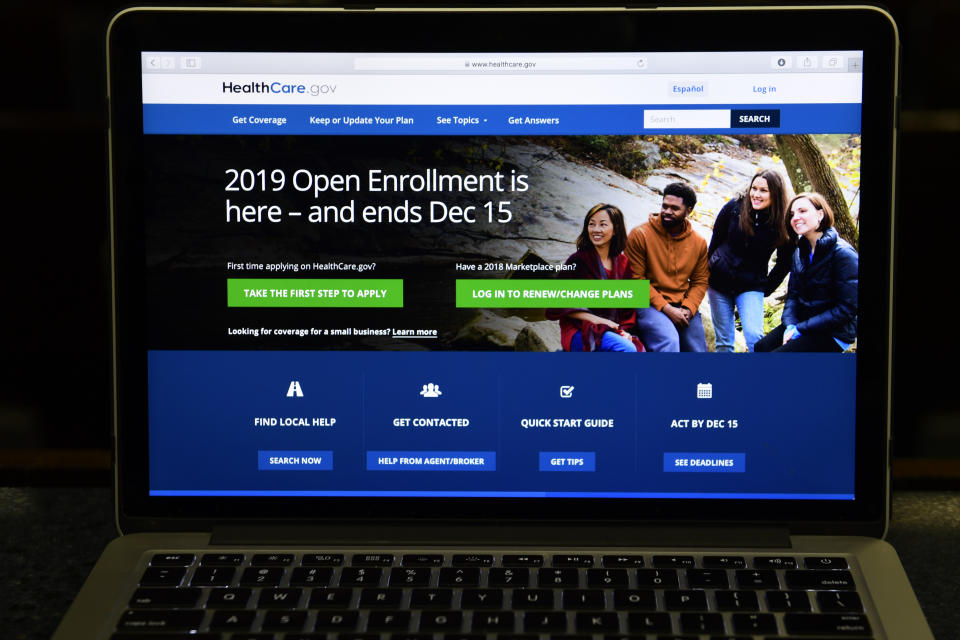Trump is fibbing on pre-existing conditions
Health care is a top issue in this year’s midterm elections, with voters worried insurers might once again be allowed to deny coverage to Americans with preexisting conditions, or charge them far more for coverage.
They should be worried. Republicans are still trying to kill the Affordable Care Act, including the provisions that ban insurance companies from charging riskier patients more. The Trump administration supports the move to kill the ACA. And President Trump is fibbing about a Republican backup plan to protect vulnerable patients.
“Republicans will totally protect people with Pre-Existing Conditions,” Trump tweeted on Oct. 24. He’s referring to Republican legislation that would restore some patient protections if Republicans succeed in killing the ACA. But the GOP bill would leave millions of patients newly vulnerable, because it doesn’t go as far as the ACA. And that’s only if the law were to pass.
“The Republican legislation is not as strong as the ACA,” says Katie Keith, a faculty member at Georgetown University Law Center who follows health policy. “It would leave some significant gaps for people with pre-existing conditions. We’ve seen move after move from this administration meant to undermine coverage for people with pre-existing conditions.”

The latest effort to kill the ACA centers on a lawsuit filed in Texas by attorneys general from 20 Republican-controlled states. The trigger for the suit was a provision in last year’s tax law that eliminated the penalty for people who don’t have health insurance. The so-called “individual mandate” remains. But beginning in 2019, there will be no penalty for people who violate it, which is like saying a driver can’t be fined for speeding even if speeding is illegal.
The details are complicated, but the suit argues that without an enforcement mechanism, the individual mandate is unconstitutional, and if part of the ACA is unconstitutional, then the whole thing is. The federal government, which must administer the law, is technically the defendant in the case. But in a Trumpian twist, the Justice Department has officially sided with the plaintiffs, agreeing that the ACA is unconstitutional.
The ACA protects vulnerable patients in four basic ways. It prevents insurance companies from denying coverage to somebody for medical reasons, such as having cancer or a family history of cancer. It also prohibits insurers from issuing policies that fail to cover health problems a patient has or might be prone to. Nor can insurers charge riskier patients more except for a couple of reasons, such as tobacco use, and even then, there are limits. The ACA also disallows higher premiums for reasons of health status unrelated to illness, such as being pregnant. In general, the practice of charging higher premiums to people who might need costly care, or simply denying coverage to such patients, ended when the ACA went into effect in 2014.
If Republicans succeed in killing the ACA, protections for vulnerable patients will die along with it. “If the entire ACA is thrown out, the first thing would be chaos,” Larry Levitt of the nonprofit Kaiser Family Foundation tells Yahoo Finance. “Unwinding the ACA on a dime would be tremendously disruptive.” In addition to the 102 million Americans with pre-existing conditions, the demise of the ACA would hit young adults covered under their parents’ policies, 18 million people getting subsidized care under the law, and even Medicare patients who got new help covering prescription drug costs from the ACA.
Senate Republicans, perhaps anticipating a fractious outcome in the Texas case, introduced legislation over the summer that would mandate some patient protections. It would require insurers, for instance, to provide coverage to everybody. But it would allow them to exclude pre-existing conditions from coverage. So if you had cancer, insurers would have to sell you a policy—but it wouldn’t have to include coverage for cancer treatment. Insurers would also be allowed to charge more based on a patient’s projected costs, which means factors such as gender, age, personal habits and even the type of job you do could lead to higher premiums.
The judge in the Texas case, Reed O’Connor, is a George W. Bush appointee who could rule on the case any day. Possible outcomes range from a complete defense of the ACA, in which nothing changes, to a ruling that invalidates select parts of the ACA, or the entire law. If O’Connor strikes down all or part of the ACA, supporters of the health law would appeal immediately. It could eventually land at the Supreme Court, though probably not in the current 2018-19 term.
“Nobody is going to be impacted by anything right away, even if the law is struck down,” Keith says. “That could set us up for another blockbuster ACA decision coming out in summer 2020.” That’s an election year, of course. So if voters don’t tell politicians how they feel about health care protections in this year’s midterm elections, they might not have to wait long for another chance.
Confidential tip line: rickjnewman@yahoo.com. Click here to get Rick’s stories by email.
Read more:
Rick Newman is the author of four books, including “Rebounders: How Winners Pivot from Setback to Success.” Follow him on Twitter: @rickjnewman

